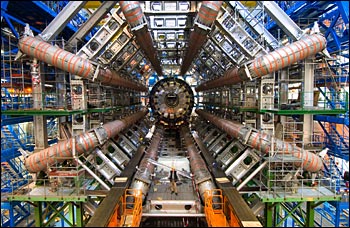Higgs-hunting ‘big data’ software to be available to researchers
September 13, 2012
Software used for processing huge volumes of data from experiments at the Large Hadron Collider will soon be available for science and engineering research that relies on “big data.”
The University of Texas at Arlington is teaming with the U.S. Department of Energy’s Brookhaven and Argonne National laboratories to develop a universal version of PanDA, a workload management system built to from experiments at the Large Hadron Collider in Geneva, Switzerland.
The computing hardware associated with ATLAS is located at 100 computing centers around the world that manage more than 50 petabytes, or 50 million gigabytes, of data. PanDA links the computing centers and allows scientists to efficiently analyze the tens of millions of particle collisions taking place at the Large Hadron Collider each day.
“PanDA has been an extremely useful piece of software. We could not have found the Higgs without it,” said Kaushik De, a physics professor and director of UT Arlington’s Center of Excellence for High Energy Physics.
“We are anticipating the first release in about 1 year,” De told KurzweilAI. “A lot of the code has to be re-written to make it easily usable by others. Also, the LHC is still running. We are busy analyzing more and more events, to measure the properties of the Higgs boson, and look for any other new discovery in physics. Our first focus is still improvements for the LHC.
“PanDA was written for ATLAS by people in the experiment and runs in Linux. The DoE funding will allow us to create a package that others can use. We plan to release the package as open source, at no cost.”
UT Arlington and Brookhaven developed PanDA for use by the ATLAS collaboration, a particle physics experiment at the Large Hadron Collider at CERN. ATLAS includes 3,000 physicists from UT Arlington and more than 170 other institutions, 40 of which are in the U.S. In July, it was one of the groups that made headlines by announcing the discovery of a new particle that scientists said could be the Higgs boson, also known as the “God particle.”
As an example of the possible applications, officials at the Alpha-Magnetic Spectrometer, or AMS, are considering adopting PanDA software, De said. AMS is an International Space Station experiment looking for dark matter in the universe.
